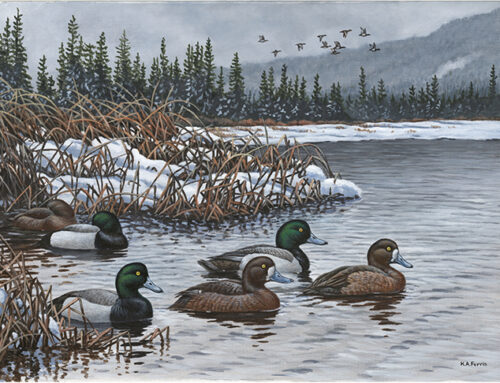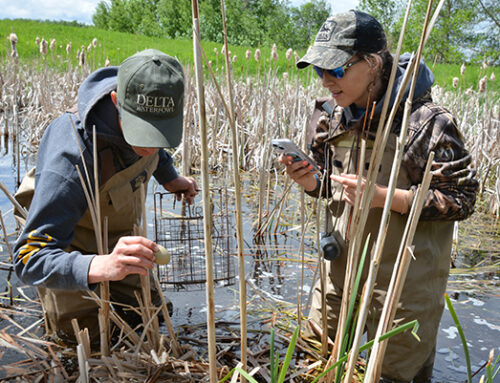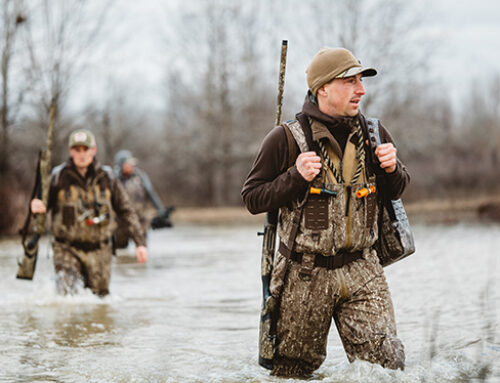2018 Farm Bill Provides Numerous Benefits for Ducks and Duck Hunters

Highlights include conservation of key breeding duck habitat, increased CRP acreage, additional wintering waterfowl habitat and more money for hunting access programs
By Paul Wait
The Agricultural Improvement Act of 2018, a massive piece of legislation more commonly known as the 2018 Farm Bill, provides immense benefits for ducks and duck hunters. President Trump signed the bill into law on Dec. 20.
The Farm Bill, which will be in effect through 2023, contains favorable provisions and programs that conserve key prairie habitat for breeding ducks and establish additional wintering habitat. The bill also increases funding for hunting access programs.
“We are delighted that Delta Waterfowl’s top conservation priorities were included in the new Farm Bill,” said John Devney, senior vice president of Delta Waterfowl. “This Farm Bill is a good one for ducks and duck hunters, as well as for farmers and ranchers. It provides for five years of strong conservation on America’s working farmland.”
Here are the key waterfowl and wetlands conservation items in the new Farm Bill:
Swampbuster — Wetland conservation compliance was retained, which provides essential protection for prairie wetlands. Maintaining Swampbuster is one of Delta’s highest priorities because it ensures wetlands are not drained or converted to croplands in the prairie pothole region, the most critical region for duck production in the United States.
Conservation Reserve Program — The acreage cap and funding for CRP acreage increases each year to reach a cap of 27 million acres in 2023. The current cap is 24 million acres. While payment rates to farmers are reduced slightly, other important incentives and establishment costs have been retained, which should mean CRP enrollment will remain an attractive option. CRP acres — especially those in the prairie pothole region — conserve critical wetland habitat for breeding ducks.
Working Wetlands — Delta Waterfowl’s Working Wetlands pilot program was used as the model to establish a new voluntary, incentive-based program to conserve many of the most important, at-risk wetlands for breeding ducks in the prairie pothole region. The program is designed to prevent drainage of vital temporary and seasonal wetlands — small, shallow ponds imbedded in working farmland that provide pair habit and essential invertebrates to nesting hens and ducklings. This program is a major win for ducks and duck hunters, as it has the potential to conserve a massive number of critical duck-producing wetlands.
Wintering Waterfowl Habitat — The Environmental Quality Incentives Program provides incentives to landowners to flood cropland after harvest to increase wintering habitat for waterfowl in Louisiana, Arkansas, Mississippi, Texas and California. Flooding cropland post-harvest provides food for ducks and geese, and also attracts and holds waterfowl in core wintering areas.
Increased Hunting Access — Funding for the Voluntary Public Access and Habitat Incentive Program increases by 25 percent to $50 million annually. States use this money to establish and fund programs that allow public hunting access and opportunities on private lands.
Delta Waterfowl and its members sincerely appreciate the work done by Senate Agriculture Committee Chairman Pat Roberts, R-Kansas, ranking Senate member Debbie Stabenow, D-Michigan, House of Representatives Agriculture Committee Chairman Mike Conaway, R-Texas, ranking House member Collin Peterson, D-Minnesota, members of the conference committee, the Senate and House agriculture committees and their staffs who worked tirelessly to pass an especially good Farm Bill for ducks and duck hunters.
“Farm Bills are the result of incredibly hard work by so many people,” Devney said. “We are especially proud of the collaboration and cooperation that was visible throughout the process by so many conservation partners, legislative leaders and staff. This type of teamwork is essential in getting the very best outcomes.”






Leave A Comment